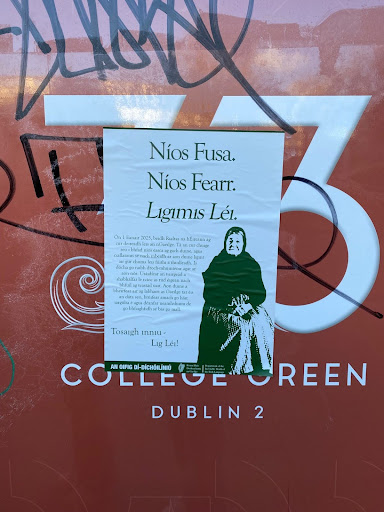Tommy Gavin
I’m Tommy Gavin, I am the editor and founder of The University Times Magazine, the year before that I was the Deputy Editor of the University Times, and before that I completed a Higher National Diploma in Journalism.
We’ve heard a lot of vague platitudes and sweeping promises, but there are ultimately two problems facing the candidates for the Communications office. The first is how to address the disconnect between students and the SU, and the second is what to do with The University Times in an age when print media is in decline. The solutions to both lie online.
My opponents want to bridge the disconnect by making the SU more involved in our lives by setting up lecture addresses, soapbox debates and open house forums. Having spent the last week talking to students, I don’t think anybody wants the SU more visibly involved in our lives. This approach is part of the reason there is a disconnect in the first place; it is the one-way top-down style of communication we are used to that prevents people from wanting to know more about their Union, (That’s also the reason I didn’t want to have 50 people in “VOTE TOMMY” t-shirts cramming leaflets in people’s faces, it just annoys people. I hoped my astronaut cut-out on facebook.com/tommyforcomms would be less intrusive and more interactive).
My solution is to create a SU forum online, where students can interact with each other and their Union in a two way dialogue. We can use the code that www.reddit.com uses, which is open source and therefore free to use, and host it on the SU servers. This means that most of the hard work it would take to develop is already done, and the advantage of the reddit model is that there is an upvote/downvote function for posts, which is like a like/dislike button. If a post that was critical of the SU got a lot of upvotes, the SU would be forced to recognise it, and if an SU post got a lot of downvotes, it would be forced to reconsider. I’ve been discussing this idea with software engineers and it would be simple to implement, but would give Trinity a tangible online community, which would also be a great space for people to get involved with interests like LGBT awareness, use of the Irish language, and music in Trinity.
It would provide an opportunity for real engagement with the SU, on students’ terms in their own time, if they choose to, from the comfort of their homes. There would be no onus on students to show up to speeches, and the online forum would only need to be set up once, and could then be moderated by the Communications committee. One thing my opponents have not said is how they would balance setting up their new clinics and hubs, and edit The University Times. Would they maintain the current production schedule? Do they think it is acceptable that the UT costs between €1500 and €3000 per issue to print?
The University Times is a service provided by the Students Union that has already proven its worth, winning “Student Newspaper of the Year” for three years in a row at the National Student Media Awards. It was set up to inform, educate and entertain students with news they might not get otherwise, and to be editorially independent so that it could hold even the SU to account. This is a hugely important responsibility, and so the race really comes down to who we are electing as Editor of the UT, and it is crucial that they have the right experience in news gathering and editing.
I want to turn the University Times into a digital-first newsroom, putting the news online as it happens, where it should be, instead of waiting four weeks for the print to come out. This way, we can actually save money, and do a better job because the news cycle has already moved online anyway. This would also include making the website more mobile friendly, which would be much better than an app because you wouldn’t have to download anything, and unlike an app, you’d be able to share articles. I also want to turn the newspaper into a glossy 48 page news magazine that would come out every two months, and would provide investigative feature journalism, putting the news we report online into context.
This is an innovative approach, but not wholly original. Several student newspapers in the United States, such as The Cavalier in the University of Virginia, and The Emerald in the University of Oregon, have very successfully transformed into digital first newsrooms with news magazines. I think we will start to increasingly see that transformation in professional journalism as well, and we can be ahead of that curve. It would mean money saved for other SU services like the Student Hardship Fund, space for more writers who would get better experience, and a better University Times for students. Through the internet, we have a unique historical opportunity to have our voices heard. Vote for me, and I’ll see that they are.







